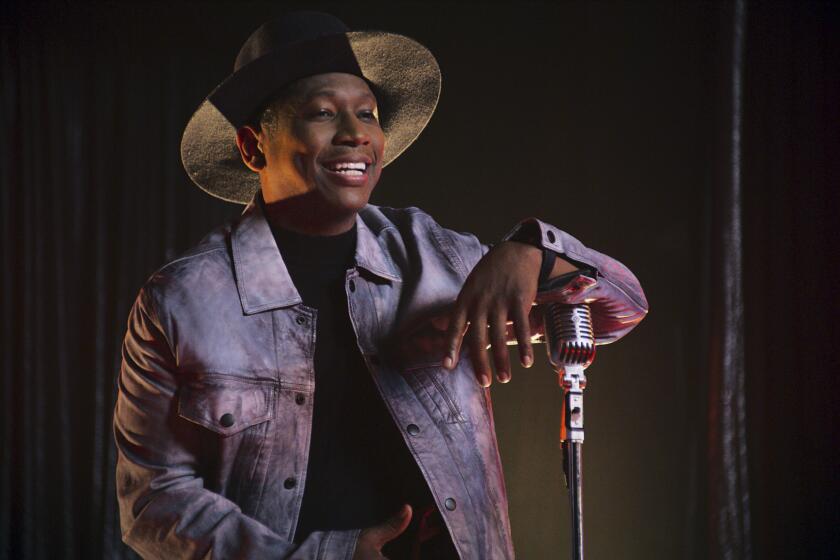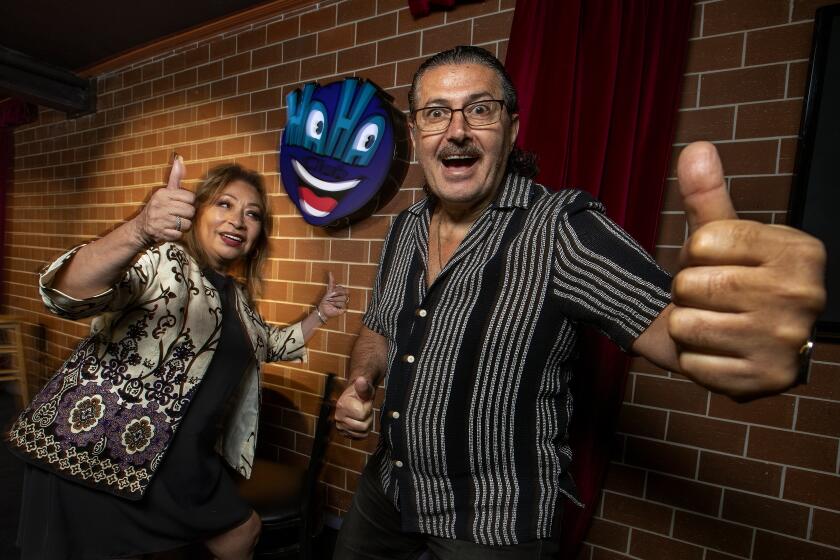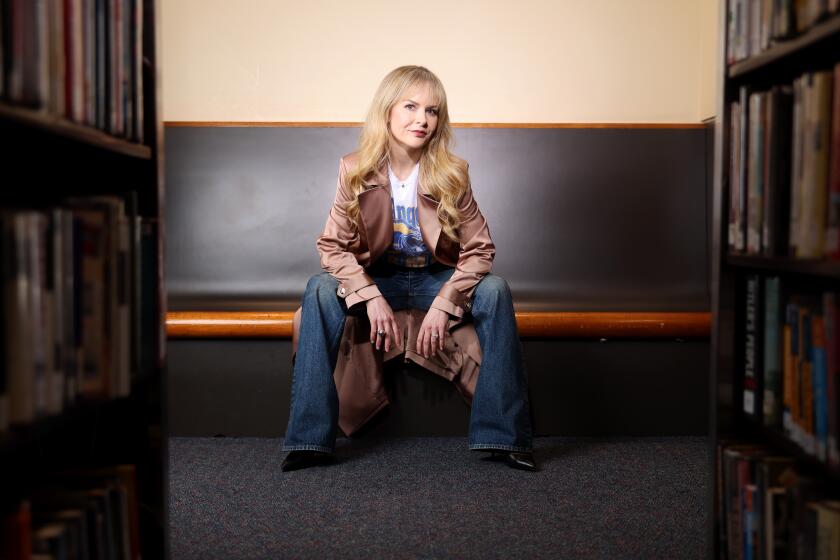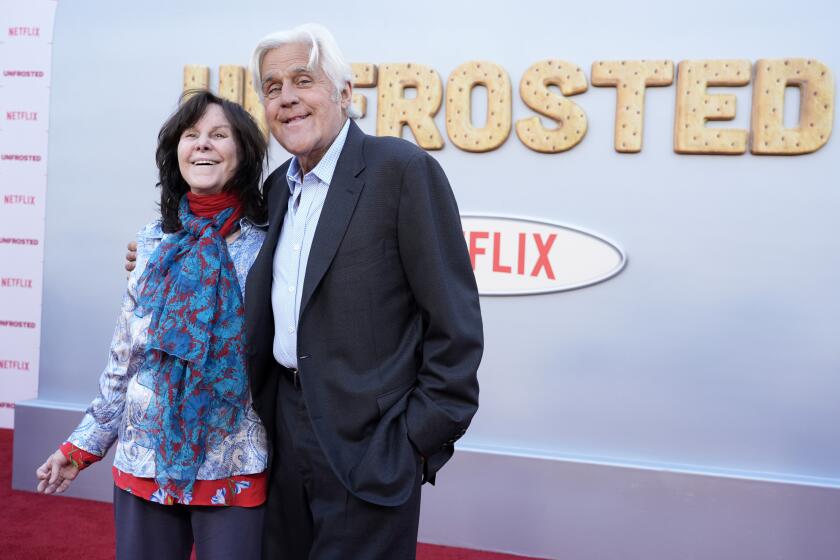Crack ‘Em Up Thursday continues breaking barriers for Black comics on its 20th anniversary
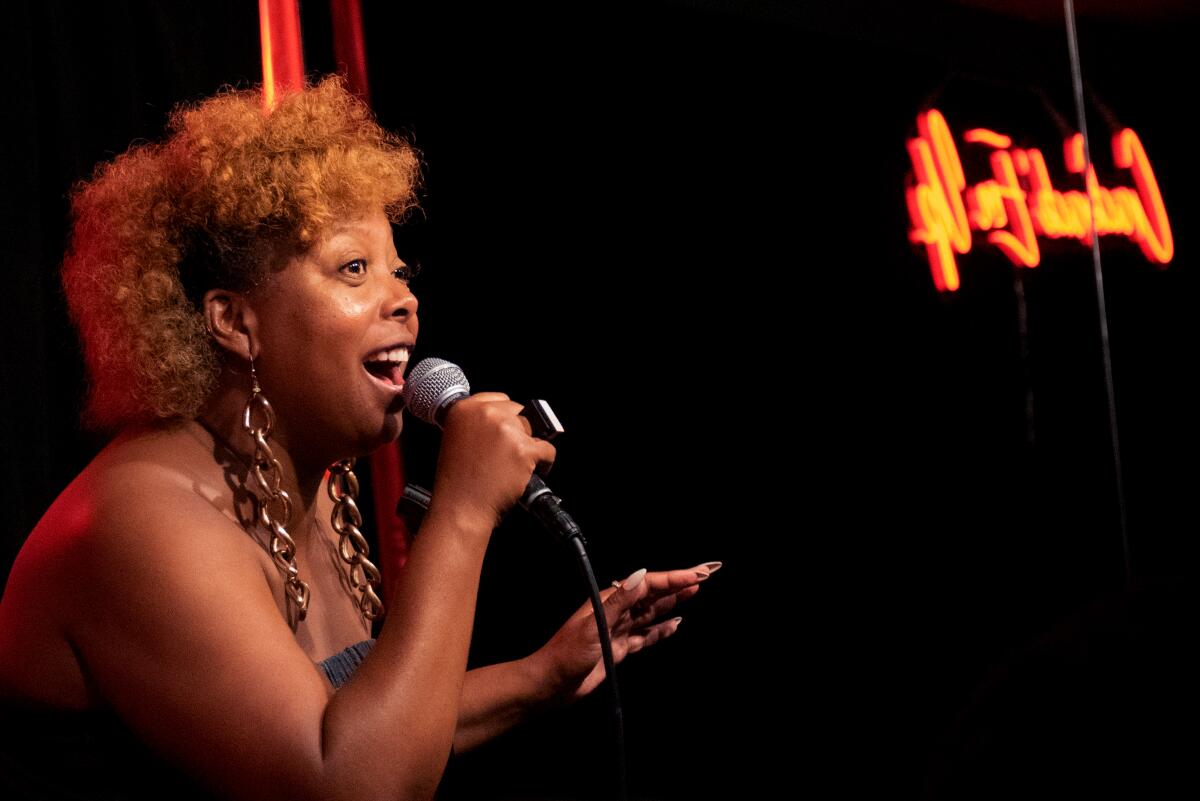
- Share via
Few things electrify the bloodstream of a working comic like landing a solid new joke in front of a crowd for the first time. It’s even sweeter for comics and the talent bookers behind the scenes who’ve used laughter to break barriers through comedy. Every Thursday night, Nichelle Murdock routinely ducks behind the sound booth at the back of the Belly Room in the Comedy Store to watch the magic unfold again and again. She may be one of the quietest people there, but the volume of her contribution as the creator of Crack ‘Em Up Thursdays can’t be understated.
What started as a small niche carved out for Black comics in the small of the Store has become its own institution within the club that welcomes everyone of all shades, to get on the mic. The only requirement: You better be funny. Celebrating its 20th anniversary on Thursday, Murdock’s weekly showcase carries the torch lit by Phat Tuesdays — the Store’s first Black comedy night — preserving the soul inside the House that Richard Pryor built on 8433 W. Sunset Blvd.
Even in a club that prides itself on tradition, history is rarely top of mind at Crack ‘Em Up. It’s always about what’s next for Black comedians and more importantly who‘s next to make their name in L.A.’s comedy streets.
Murdock came to L.A. in 2000 after working as a producer for BET’s Comic View before starting Crack ‘Em Up in 2003. In the early days when she came to L.A. to survey the comedy scene, one of the first things she noticed was a lack of high-profile stages for Black comics.
“I wasn’t really seeing any places for Black comics,” Murdock said. “There were also no Black comedy clubs and I just felt like, ‘OK, I’m seeing these great comics at the Comedy Store but I’m not seeing any Black faces on the mainstream show… I wanted to provide a space that was more than just a hole in the wall where we could be represented.”
Then she read a story in The Times about the Comedy Store featuring comedian Pauly Shore, who talked about helping to revive the world-famous club his mother Mitzi had cultivated and called for any producers who wanted to do shows there to come talk to him. Of course that’s exactly what she did. It worked out well and she started Crack ‘Em Up as a monthly show that eventually accelerated into a weekly gig.
For years, the showcase was known for going hard from 9 p.m. to 2 a.m. as Black comics filed in nonstop to do their five to seven minutes on stage. Today the club keeps to a relatively tight, two-hour schedule from 10:30 p.m. to 12:30 a.m. The regular appearances of talented comics has also helped it become a special place among the three-room setup at the Store that includes the Original Room and the Main Room.
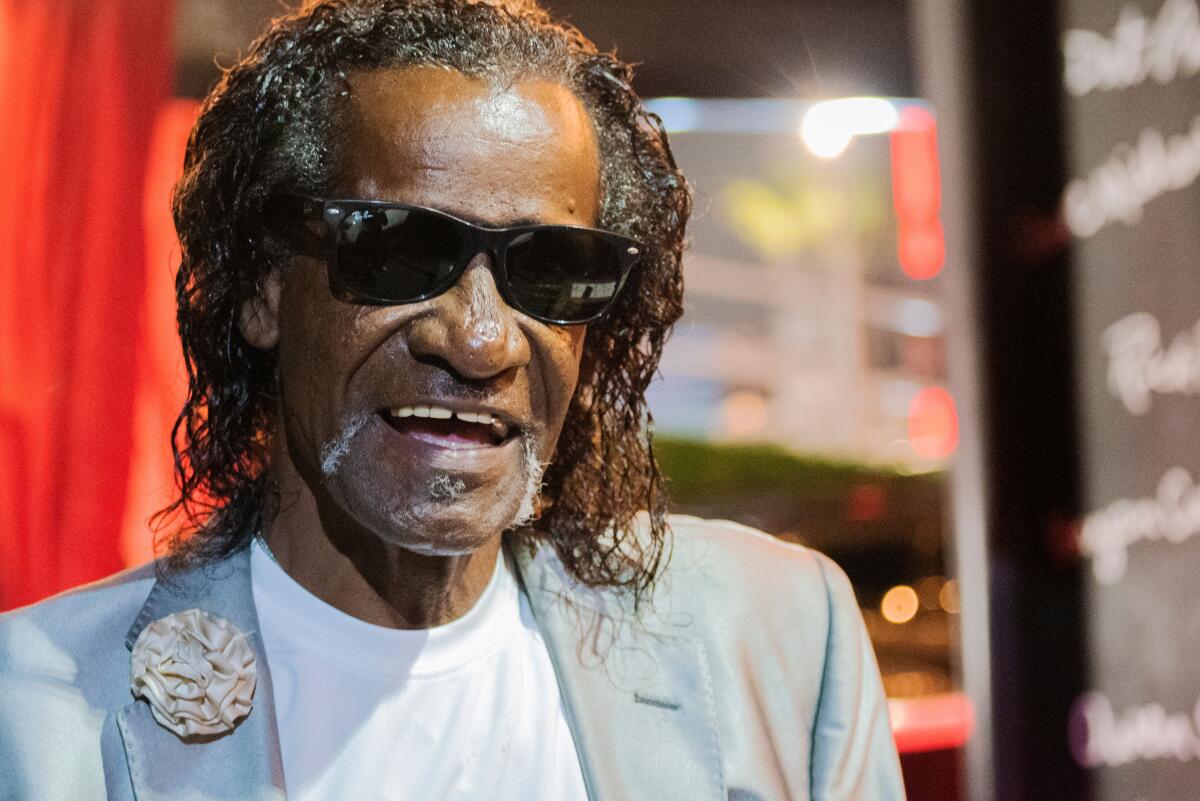
Hustling up the black metal staircase on the back patio of the Store for the late night show, guests know they’re in the right place when they’re greeted by Levi Alexander, better known as “Uncle Levi.” Crack ‘Em Up’s jheri curl-sporting, superfly maître d was once described by Dave Chappelle as the ghost of Miles Davis.
Dressed to the nines at every show with freshly moistened curly locks, a thin mustache and goatee, sharp suit and a smile, he’s the first to welcome guests as they enter the black box showroom at the top floor of the Store. Since befriending Murdock right before she started Crack Em Up, Uncle Levi offered to work the door and oversee the room during the show. Now 73, he’s remained a fixture of Crack Em Up at the shows ever since.
“When you work with good people who know what they’re doing you eventually find out what their goals are,” Uncle Levi said. “[Nichelle’s] goal is to be a top producer. She curates, she produces and she manages and I’m the manager for her. I manage her floor and everything around it.”
That includes managing the vibe of the night from start to finish. Outside the Belly Room, Uncle Levi’s old-school charm adds to the spirit of a Sunday church service or a family function.
“What makes me feel so good, people can be passing shout ‘Hey Uncle Levi!’ I just shout back ‘Hey niece! Hey nephew!’ I stopped trying to learn their names,” he admits. “I call everyone niece and nephew. That keeps me from being stressed out, because if you call a comedian the wrong name they get mad.”
Stepping into the Belly Room under the glow of the neon red Crack ‘Em Up sign hanging above the stage is a welcome reminder that Black comics are free to tell jokes to diverse audiences who’ve come to the show to feel at home. White comics booked on the show often comment about getting the diversity slot on the bill as everyone laughs together.
Rather than relegating Black comics to bars and hip-hop clubs far away from Hollywood, Murdock’s showcase is the proving ground where showbiz scouts sneak into the audience to watch talent that rarely gets to shine aside from Chocolate Sundaes at the Laugh Factory and Monderays at the Improv.
At Crack ‘Em Up, the hosting gig has become a coveted slot that gives comics a chance to own the crowd. The show is known to go from modestly attended to sold out in minutes as packs of late arrivals quickly fill the room to catch local favorites, touring stand-ups and drop-in sets from big names like Kevin Hart, Chappelle, Deon Cole and Damon Wayans who show up throughout the night.
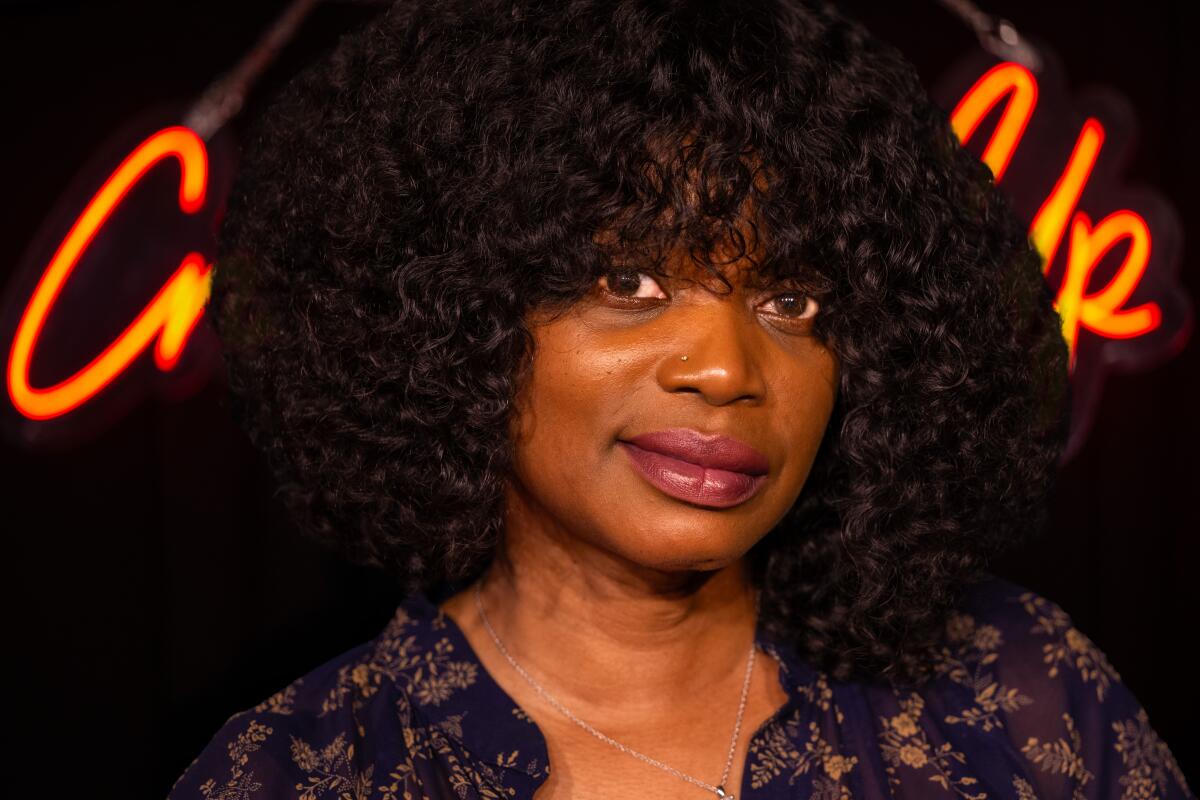
“When I started the night it wasn’t cool to be up [in the Belly Room], but we made it cool to be up there,” Murdock said. “That’s the magic of Crack ‘Em Up is that you never know who is gonna show up, or what time.”
Recently, Hart and a film crew paid a visit to the show to shoot a quick scene for a TV pilot using Crack ‘Em Up as his backdrop. No one in the crowd was aware of the surprise guest until the comedy mogul and his crew swooped in for 30 minutes to grab quick footage of Hart acting and performing a comedic role for a stunned early-bird audience right when the showcase started.
“People who showed up on time got a nice surprise,” Murdock recalls. “After [Hart and his film crew] left, we brought in the rest of the audience who was late and everyone was like ‘What, Kevin Hart was here?!”
Two decades later, she says the joy of creating a space for Black comedy in Hollywood is still worth fighting, especially in the development room of the world-famous comedy club.
“The energy that you get from a black box theater is amazing especially in comedy, the comics need that energy and we try to give it to them from the day they’re booked all the way to when we get off the stage and out the door.”
She remembers developing comedian Tony Baker early in his career and putting him on stage as a Crack ‘Em Up host at a time when he might not have been the most comfortable, knowing that he’d one day become a force to be reckoned with — she was right. Others like Leslie Jones of Saturday Night Live fame, Justin Hires, Chico Will and Esau McGraw have taken turns commanding the room with animated swagger, slick punchlines and a helping of late-night lewdness. Murdock makes it a point to rotate through different hosts over the years — 32 in all since the show started.
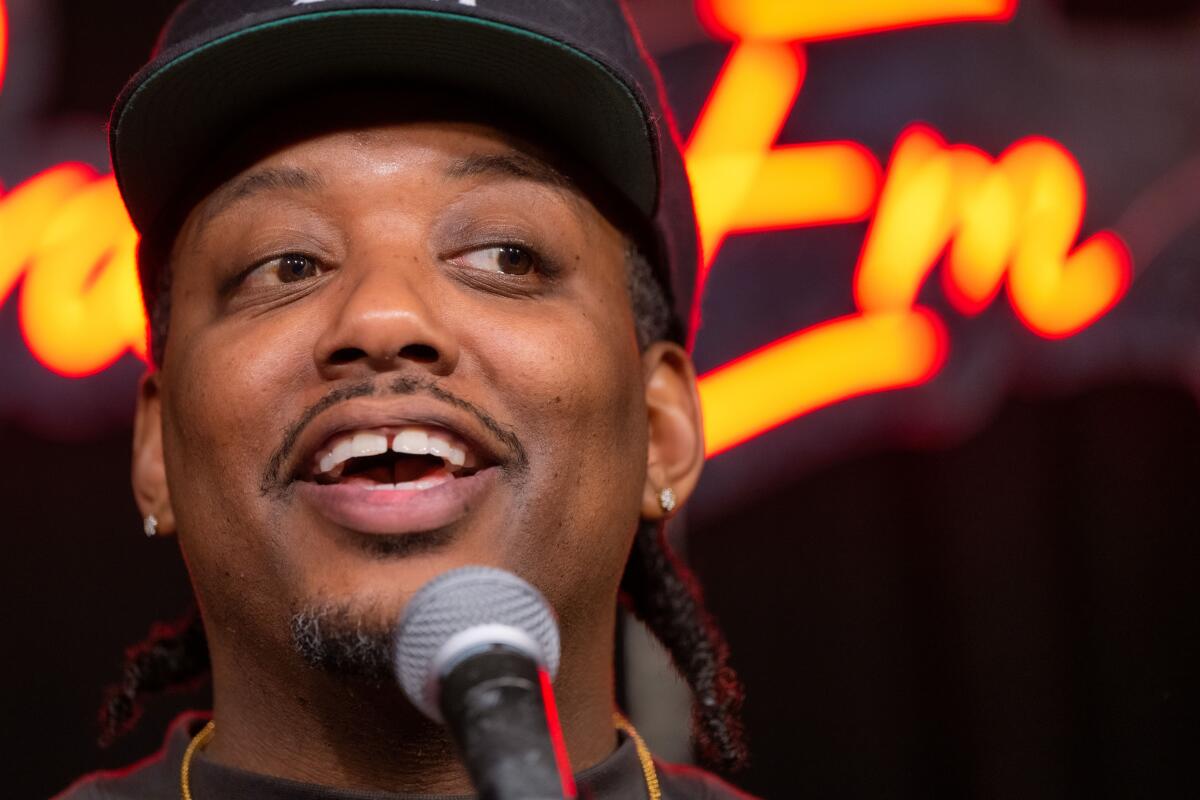
“There’s not a lot of places where a Black comic can go to express that creativity and having a Black night at a historic comedy club like this, it just kind of it brings out the artist in all of us,” comedian and current Crack ‘Em Up host Chris Powell aka “Comedian CP” said. “This is where the pros go to play. And having a Black night that’s dedicated to us gives us an opportunity to stretch our wings a little bit and be more creative.”
As one of several female bookers at the major clubs in the L.A. comedy scene, Murdock says having the show in the Belly Room is important because it was originally designated by the club’s late owner Mitzi Shore as a place where female comics could work out their material. Over the years, Murdock’s show has seen a major increase in female comics coming up to perform and destroy the room like former host Del Harrison who finds solace in the family vibe that Murdock has cultivated.
“Nichelle’s night has been such a launching pad, even in my own career,” Harrison said. “When I lived in D.C. I used to work for an airline, she would give me stage time when I was in town.” When Harrison relocated to L.A., she persistently asked Murdock if she could be a host and the comedian eventually got her a shot and ended up hosting for two years as well as hosting the Crack ‘Em Up podcast. Even after comics finish their stint hosting the show, they still benefit from Murdock’s belief in their talent.
“She still books me on her show to close it out, or she’ll recommend me to different talent agencies. Even though the hosts rotate the opportunities don’t stop,” Harrison said. “My other home girl auditioned for Wildin’ Out through Nichelle. She’s giving people so many opportunities because she’s the plug to the most prominent Black spot for comedy.”
Though it will always have its home in the Belly Room, Crack ‘Em Up’s 20th Anniversary show is set to take over the Store’s Main Room this Thursday hosted by Carl Payne. The lineup will feature a growing list of past hosts, regulars and special guests who are gracing the stage for the show for its historic moment. For Murdock the recognition for her and her comics on the club’s main stage feels good as landing two decades worth of brand new jokes for the first time.
“I feel the pressure but it’s a good pressure,” Murdock said. “With the Belly Room, the energy is compressed, it’s upstairs, it’s safe. But that Main Room is symbolic, it’s electric. Even though I don’t hit the stage as a producer, I know that it’s my time to shine as well.”
More to Read
The biggest entertainment stories
Get our big stories about Hollywood, film, television, music, arts, culture and more right in your inbox as soon as they publish.
You may occasionally receive promotional content from the Los Angeles Times.
